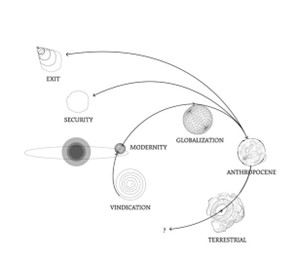Retrospective: Educational Encounters workshop with Bruno Latour's Philosophy of the Earth

16 June 2024
The French collective S-Composition continues the work of philosopher Bruno Latour by building bridges between art, science and politics. They bring together scientists, artists, citizens, pupils and students for educational exchanges and co-creation, to arrive at a new perspective on the future of our planet. On Monday, June 3, S-Composition hosted a workshop at the University of Humanistics. A brief report from organizer Caroline Suransky.
In recent decades, global awareness of the climate crisis keeps growing. This crisis places the mission of the University of Humanistic Studies in a new light. After all, it is clear that an academic contribution to realizing "a humane and meaningful society" is only possible on a livable earth.
The UvH wants to make more room for education and research about sustainable human life with respect for planetary boundaries, in which the entanglement of human life with all other life forms on earth appears as important perspective in efforts to enhance human flourishing. Several thinkers can help us to develop new perspectives. One such thinker is Bruno Latour. His work offers valuable starting points for UvH's transdisciplinary ambitions. It brings together knowledge that is generated within the social sciences and humanities in the field of sustainable living in a critical manner, while paying attention to epistemological questions. In addition, the Arts play a major role in his ideas, which fits well with, for example, with our thinking on "Artistic Research”.
Against this background, Caroline Suransky and Emeritus Professor of Ethics Henk Manschot, invited the French collective S-Composition to facilitate a workshop that took place on Monday, June 3, 2024. Participating in this workshop were 42 students and staff from the UvH, as well as from other Higher Education institutions, the Humanist League (HV) and several ecology-focused non-profit organizations, some of which are led by UvH alumni.
Seven planets
S-Composition continues the work of Bruno Latour, who died in 2022, by building bridges between art, science and politics. They bring together scientists, artists, citizens and students for educational exchanges and co-creation. In doing so, they draw on core concepts of Latour, such as critical zone, geopathy, new climate regime and ecology of perception.

After a welcome by UvH rector Joke van Saane and short introductions by Henk Manschot and Caroline Suransky, Chloé Latour and Jean-Pierre Seyvos introduced a number of active exercises in which they connected knowledge and experiences in order to create new awareness, and open new perspectives for action in the context of the climate crisis. Central were Latour's ideas around the "Seven Planets," which helped us to explored themes related to different perspectives and the way people inhabit the world. In doing so, the metaphor of a fictional planetarium illustrated how people with different worldviews and priorities could well live on different planets, given their differing perceptions of reality, values and responses to climate change.
The final exercise of the day was facilitated by lector Hester Dibbits of the Reinwardt Academy and UvH alumnus Rosa Mul. Their exercise, called "emotion networking", is inspired by Latour's thinking and was previously introduced in the project Colonialism in the Walls of the UvH. HKU lecturer and illustrator Katja Fred's drawings gave an impression of the day.
See also
Ahead of the workshop at UvH, the Humanist League interviewed Chloé Latour. The interview can be accessed here:
https://www.humanistischverbond.nl/nieuws/chloe-latour/The French collective S-Composition continues the work of philosopher Bruno Latour by building bridges between art, science and politics. They bring together scientists, artists, citizens, pupils and students for educational exchanges and co-creation, to arrive at a new perspective on the future of our planet. On Monday, June 3, S-Composition hosted a workshop at the University of Humanistics. A brief report from organizer Caroline Suransky.